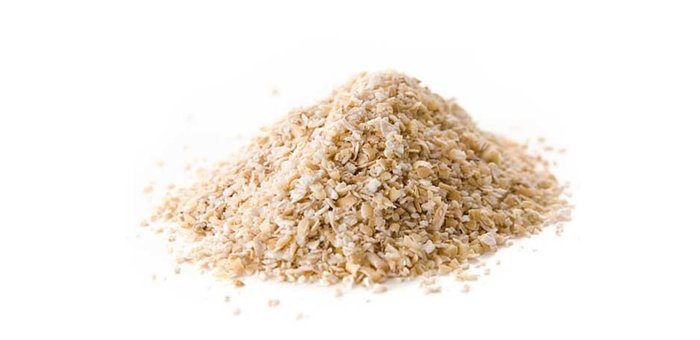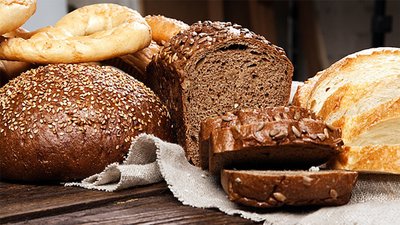For years, gluten-free diets have been both praised and demonized in the health-and-fitness community. For many people, a gluten-free diet is simply part of healthy living. Others avoid gluten so that they can also control the symptoms of celiac disease, an autoimmune disorder in which consumption of gluten causes damage to the small intestine. Still others think the whole thing is nothing but one more entry onto a long list of fake food-product news.
Whether eating a gluten-free diet is a matter of choice or necessity for you, here's what you need to know about this problematic protein.
What Is Gluten, Anyway?
Gluten isn't some man-made, toxic, chemically corrupt ingredient, it's a protein found naturally in wheat, barley, and rye. Food makers use it to add texture, shape, and elasticity to breads, pastas, and crackers. Gliadin, a protein structure found in gluten, plays a key role in allowing bread products to rise during baking. Gluten can also be an ingredient in everything from beer to chicken broth to seasonings—even candy.

Many people are choosing to go gluten-free these days either in the belief that it will make them healthier, or as a way to prevent gastrointestinal problems that may or may not be caused by gluten.
There's a downside to removing gluten, though: Your diet can wind up with inadequate amounts of B-vitamins, iron, and dietary fiber. Research suggests eating whole grains that contain gluten may lower the risk of developing Type 2 diabetes and cardiovascular disease.[1] Unless you're confident your body can't handle foods that contain gluten, it can be perfectly good for your health.
Celiac Disease vs. Gluten Sensitivity
Whether you're walking down a grocery aisle or reading a restaurant menu, the words "gluten free" are hard to escape. This may lead you to believe that there are hordes of people with celiac disease who must be warned of potential threats to their well-being. It is true that people with celiac disease must be very careful consuming anything with gluten in it. But, in fact, only 0.3-1.2 percent of Americans have been diagnosed with this disease.[2] Celiac is diagnosed by a physician after a series of tests that may include blood tests and intestinal biopsies. People diagnosed with celiac disease must avoid gluten to keep their small intestine healthy.
There are, however, many others who have—or think they may have—a sensitivity to gluten. Different from celiac disease, gluten sensitivity is also known as gluten intolerance or non-celiac gluten sensitivity. Like celiac disease, gluten sensitivity affects an extremely small portion of the general population.[2]
If even the combined problems of celiac disease and gluten sensitivity impacts such a small part of the population, then why do so many individuals from within the fitness community vilify gluten? And does gluten stand in the way of you reaching your physique and performance goals?
Gluten and Fat Loss
Gluten-free eating has been associated with fat loss within the fitness community. To date, no evidence supports the assertion that, when calories are controlled, following a gluten-free diet in and of itself will result in fat loss.
Muddying the waters is the fact that many people, when starting a gluten-free diet, often move from a diet that included many high-calorie processed foods to a diet including more low-calorie foods, including fruits and vegetables. How big a contributor to weight loss is this change of diet as compared to the removal of gluten itself? The jury is still out on this question.
Just like with any fad or elimination diet, these dieting strategies usually do result in weight loss—for the simple reason that they decrease total daily caloric intake and encourage dieters to make smarter food selections.
Gluten and Performance
Many athletes believe that following a gluten-free diet can increase exercise performance. That might be true for people with a clear case of gluten sensitivity or celiac disease. Unfortunately, no objective test measures gluten sensitivity. It is typically self-diagnosed based on an individual's subjective feelings after eating gluten. This can get tricky when the person is, for instance, a long-distance runner for whom the motion of running itself can cause stomach distress.

Athletes who mistake this kind of stomach problem for gluten sensitivity may be tempted to make unnecessary changes to their diets and, sometimes, replace healthy foods like whole-grain breads with less healthy, more processed alternatives.
For a study on the impact of gluten on performance, a team of researchers selected a group of competitive endurance athletes with no history of gluten-related sensitivities of any kind—athletes who were able to consume gluten without any apparent physical reaction. The researchers then put these athletes on a strict gluten-free diet to test whether the absence of gluten would improve or diminish their performance. At the conclusion of the study, researchers concluded that, at least in the short-term, a gluten-free diet had no measurable effect on performance.[3]
Athletes who do, in fact, have celiac disease or gluten sensitivity must treat these conditions with respect. Celiac disease can cause problems with iron absorption and lead to anemia. Celiac can also interfere with vitamin D and calcium absorption, which can lead to osteoporosis and poor bone health.[4]
Gluten and Digestive Health
If you suspect you have a gluten sensitivity, first try an elimination diet. This is an experimental process in which you monitor your body's response as you remove foods containing gluten from your diet. If you notice an improvement in your gastrointestinal and digestive health, you may want to get tested for celiac disease, or at least remove or reduce the amount of gluten you consume.
Keep in mind, though, that gluten sensitives are not as widespread as you may think.[2]What may appear as a gluten intolerance might, in fact, be an intolerance to dairy or certain oils or spices. If you are experiencing digestive issues, your first step should be to evaluate and assess your overall dietary patterns.
So, Is Gluten-free the Way to Be?
Although I am a dietitian, I'm not the food police. At the end of the day, it is your choice whether you want to include or avoid gluten in your dietary patterns.
Overall, however, little evidence suggests that eliminating gluten from the average diet will improve health and performance—and it may cause you to miss some important nutrients.
Of course, if you have been diagnosed with celiac disease or with a gluten sensitivity, the less gluten that enters your system, the better.
Bottom line: If you think foods that contain gluten are negatively affecting you, talk to your doctor and see if an elimination diet or celiac disease test makes sense for you.
References
- Ye, E. Q., Chacko, S. A., Chou, E. L., Kugizaki, M., & Liu, S. (2012). Greater whole-grain intake is associated with lower risk of type 2 diabetes, cardiovascular disease, and weight gain. The Journal of Nutrition, 142(7), 1304-1313.
- Bizzaro, N., Tozzoli, R., Villalta, D., Fabris, M., & Tonutti, E. (2012). Cutting-edge issues in celiac disease and in gluten intolerance. Clinical Reviews in Allergy & Immunology, 42(3), 279-287.

